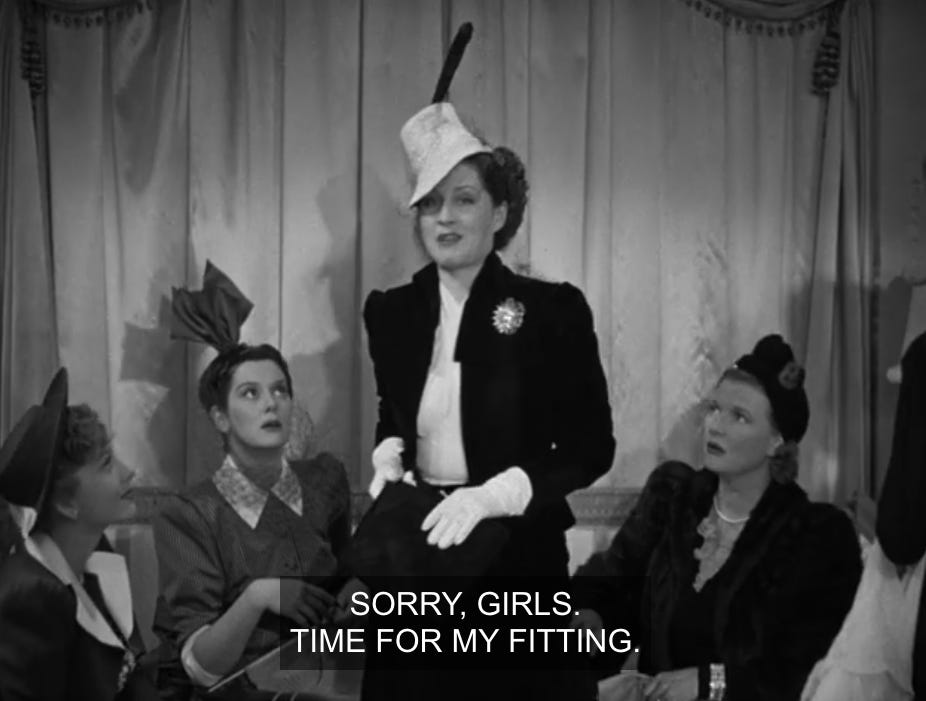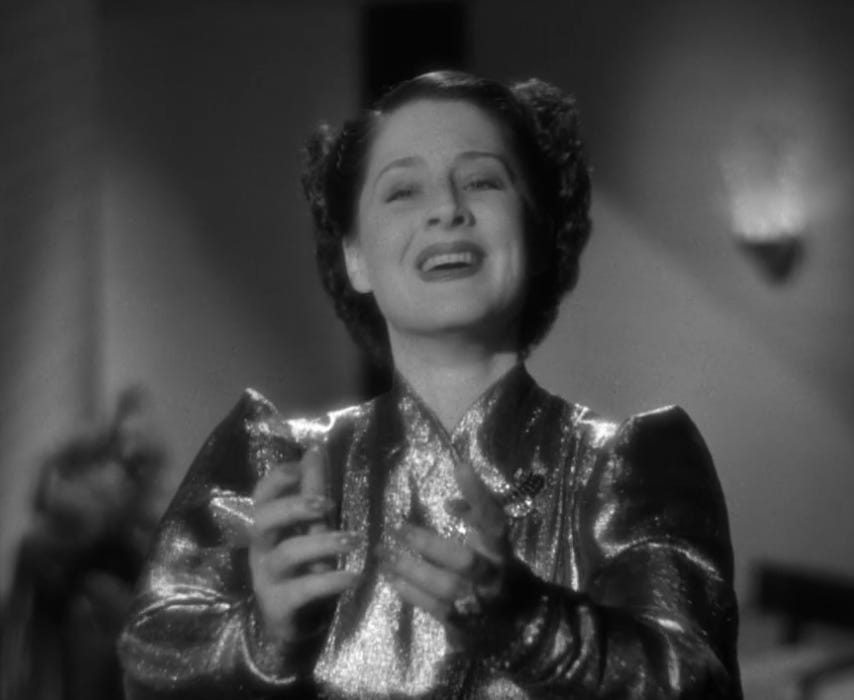"They'll All Be So Fancy; Why Don't You Be Plain?" Fashion and Religious Ecstasy in 1939's The Women
In the last two weeks I have had occasion to show a variety of friends George Cukor’s The Women for the first time, which means that I’ve watched The Women from start to finish about every 3.5 days, a fairly good record.
The Women is often remembered for its all-female cast (tagline “It’s all about men!”), although there’s a brief shot of Douglas Fairbanks, Jr. on the back of a magazine in an early scene, which goes a long way towards establishing protagonist Mary Haines’ relationship to her never-seen husband Stephen as something closer to Teresa of Ávila’s ecstatic union with the divine than, say, Katharine Hepburn and Spencer Tracy. Mary is hilariously good, in the tradition of a saint, or Ebony Dark’ness Dementia Raven Way, every bit as wedded to wifeliness as she is to her earthly husband. She suffers from an early and public injury to her Dignity, and it is from this Fisher-King-like wounding that the rest of the plot hemorrhages. On first viewing, it is possible to mistake Mary Haines for a mere Proverbs 31 drip, but George Cukor knows better than to film a drip — she’s Christ in couture, suffering limply and euphorically through her stations of the cross, betrayed by every kiss and torn apart by thorns.
Everyone from her servants to near-strangers to the friends who are all secretly writhing in envy of her goodness make reference to it at nearly every opportunity:
Lines About Mary Haines’ Goodness, which is secretly even more good than it appears on first blush, which is very good to begin with
[From her cook] You can’t fool me! You’ll cook for him like a French chef all the time you’re away. I was looking for my cookbook this morning, and I found it in your trunk.
[From her admiring lesbian friend, looking at her latest mother-daughter photoshoot in Vogue] Best angle, my foot. It doesn’t half do her justice.
[Between her admiring lesbian friend and her desperately jealous cousin] You just can’t bear Mary’s happiness, can you? It gets you down. She’s contented to be what she is. [Which is what?] A woman. [And what are we?] Females.
[From her desperately jealous cousin] You know I adore Mary. I worship her. We’re not only cousins, she’s my best friend.
[From a friend] Darling! You’re so slim, I could kill you.
[Yet another friend] How can you exercise all day and look so contented?
[From a friend] Did you ever know such a housewife?
[From her withholding mother] Stephen doesn’t love the girl. If he did, you’d have felt it yourself, long ago.
[From her drip of a daughter] You’re better than all the lions, tigers, and elephants in the whole world.
[From a faux-concerned friend] You are thin, darling. I hope it’s not from worry.
[From an atelier] Mrs. Haines, are you ill? You’ve been standing too long. Go get her a glass of sherry.
[From a dressing-room attendant] I feel sorry for Mrs. Haines. She’s so nice.
[From her housemaid] Whatever she wants to do is okay by me. I’ve got to be loyal to Mrs. Haines.
[From an admiring Countess] Those crummy newspaper pictures didn’t do you half justice.
[From a chorus girl who’s seen it all and tells it like it is] Good for you!
[From a no-nonsense rancherwoman who doesn’t waste time feeling sorry for anyone] Truth to tell, I’ll miss Mrs. H, too. She’s about the nicest ever came here.
[Countess, ibid] Mary, do put that poor darling Freddie out of his misery. Marry him, dear.
[From an admiring young innocent] But Edith, you know Mary hates situations.
Lines Doubting Mary Haines’ Goodness, as Thomas doubted the wounds in Christ’s sides
[From a jealous cousin, on her Vogue photoshoot] Leave it to Mary to see she’s photographed from her best angle!
[Ibid] Mary Haines may be living in a fool’s paradise.
[Ibid] I think Mary’s being very wise, snatching Stephen Haines off to Canada.
[Ibid, on investigating the hand soap in the guest bathroom of Mary’s second home] 10 cents! Well, it’s fine to be homespun in the country, but really.
[From her romantic rival] Can the sob stuff, Mrs. Haines. You noble wives and mothers bore the brains out of me. I’ll bet you bore your husbands, too.
[From her jealous cousin, after telling her to go into Crystal’s dressing room and face her] Of course my sympathies are with Mrs. Haines, but then they always are with a woman against a man, but she’s been awfully stupid about it. Imagine her going in that room and facing the creature! I begged her not to. I said, “Mary, where’s your dignity?”
[From a chorus girl who’s seen it all and tells it like it is] That’s what you are, Mary Haines, a blithering coward. Because you ran out of the trenches under fire. You deserted him. You think he wants to be in the grip of that red-headed octopus? If you’d given him a chance, he’d have asked you not to get a divorce.
Lines Emphasizing the Mystical Stigmata of Mary Haines
I’m divinely happy. [Look me in the eyes and say that again.] I’m divinely happy.
[Mary’s weak-willed friends realize she’s just had an evening gown snatched out from under her by her husband’s mistress and beg her to make a scene] Sorry, girls. It’s time for my fitting.
Immediately after this line is the first of Mary’s two Ecstatic Walks Towards Transcendence — one towards a dressing room (the gowns-by-Adrian version of Catherine of Siena’s anchoritic cell) just before the movie hits the hour-mark, and one towards her restored husband at the denouement. Mary has no time to indulge the false consolation of her faithless friends, not when there are clothes to draw near to! Her tears are not to be wrung out on the weak and feeble shoulders of mortal women, but for Style alone! A beautiful and unbroken tracking shot follows her stricken, enduring countenance as she moves from company to solitude, from waiting to dressing, from earthly comfort to the armor of God, all without shedding the tears that have been misting up her vision without falling for the last twenty minutes – a Sidney Carton at Sydney’s Salon.

I can’t go back. After all, I have my pride.
I feel great. [You lie!] Have it your own way.
Please, mother.
I haven’t seen the papers yet. How could I, up here? — Yes. I’d rather you told me. Of course. I understand the position you’re in. I hope you’ll both be very happy. Me? No, I have no plans. No plans at all. Do you mind if I hang up now?
I had the only man I ever wanted. If it hadn’t been for my pride…
There’s a reason Crystal Allen, who merely slept with Mary’s husband and called her boring, receives a happier resolution than Sylvia, who sought to undermine Mary’s innate goodness. In the life of the mystic, the lover of earthly delights (think a pre-Confessions Augustine, who prayed for “continence, but not yet”) is herself a potential mystic in line for conversion, for sudden seizure and confiscation by the raptures of God. Crystal is down (having lost both Stephen and her lover/escape route Buck Winston, with little hope of securing alimony) but not out: She smirks, shrugs her fur coat back over her shoulders, and says, “Well girls, looks like it’s back to the perfume counter for me,” having lost nothing by her own rules of easy come, easy go. She played fair, and got a fair outcome, and the viewer is left with little doubt that Crystal will take another crack at the Wheel of Fortune soon enough.
For Sylvia, however, there is no possibility of an easy afterlife with the virtuous pagans in Limbo – the final circle of Hell yawns open for erring and dissembling disciples and false friends. Judas, Brutus, Cassius, and Sylvia Fowler dance in Lucifer’s jaws there. She has lost her husband, her friends, her reputation; everyone knows she pays Dr. Sylvester $100 an hour out of unrequited affection, and him a fraud, to boot. Also, she is locked in a closet, and falls out with everyone’s evening wraps and handbags wrapped about her – she has lost, in the end, even her connection to Style, the greatest and last humiliation. If merging with the divine is possible for Mary in the dressing room, through the mystic and transcendent goodness of couture, then the road to Hell must also be constructed through fashion, and Sylvia slides right down it. Disorganization, chaos, no strong lines, public spectacle, and too many hats.
Mary, however, dressed at last in a gold gown strongly reminiscent of Crystal’s outfit from their first meeting (having added earthly perfections to her eternal perfections), cheerfully announces she has renounced her single and final sin of pride before gliding away into her Final Walk Towards Ineffability.

First she hurries up, then forwards, at last on equal footing with the Empyrean. Mary Haines — first a woman, then a martyr, now two women in one, with claws of Jungle Red!




this moooooovie.